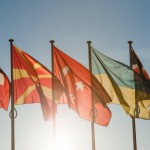By Captain Gary Palmer, U.S. Coast Guard (retired) and faculty member at American Military University
The recent downing of Malaysian Airlines flight MH17 has raised some interesting issues about international jurisdiction regarding crimes and civil liability for wrongful death. Jurisdiction refers to the scope of competence to regulate people, events, and things. International law governs the jurisdiction of a state to prescribe and enforce criminal and civil laws that apply outside its own territory. A state is sovereign within its borders and has the primary right to prescribe, enforce, and adjudicate laws within its territory.
Who Has Primary Jurisdiction?

However, it is customary for a state to cooperate with the flag state of the aircraft, states of the victims, and international organizations such as the International Civil Aviation Organization (ICAO), a specialized agency of the United Nations. The lawful government of Ukraine has no legal responsibility or liability for acts committed by rebels if they took reasonable steps to prevent and subdue the rebellion.
Principles of International Law
There are other principles of international law that may give prescriptive, enforcement, or adjudicative jurisdiction to foreign states.
- The protective principle gives a state the jurisdiction to prescribe laws prohibiting crimes committed outside a state by non-nationals but which have a potentially adverse effect upon security or government function. Examples include counterfeiting, conspiracies to overthrow the government, and drug smuggling. This principle of jurisdiction is susceptible to abuse if security and government function are defined too broadly.
- The passive personality principle seeks to justify jurisdiction over non-nationals who commit crimes against nationals regardless of the type or location of the crime. The theoretical basis for this jurisdiction comes from the duty that states have to provide for the welfare of their own nationals. Since this principle is not universally accepted, it carries no weight in claims against states that do not recognize its validity.
- The universality principle gives a state the right to prescribe and enforce laws prohibiting fundamental offenses against the interests of all states. Some have suggested that terrorism is a universal crime, and as such is subject to the jurisdiction of all states in the same way as is piracy on the high seas. However, since many states cannot agree on how to legally define terrorism, this controversy undermines the argument for universal jurisdiction.
International Laws
The Convention for the Unification of Certain Rules for International Carriage by Air (Montreal Convention) is an international treaty that regulates liability for international air travel. The Montreal Convention was concluded in 1999 by ICAO. Under the Montreal Convention, victims and their families are now allowed to sue foreign air carriers in their place of permanent residence.
A similar incident occurred in 1988 when the USS VINCENNES shot down an Iranian airliner in international airspace, mistaking it for a fighter jet on an attack profile. The United States never admitted any legal liability, but paid compensation to the government of Iran.
In conclusion, Ukraine has the primary responsibility to investigate the crash but is arguably not liable for the deaths. The states of which the victims were nationals may have a legitimate claim to extra-territorial criminal and/or civil jurisdiction based on the passive personality principle. However, this would require them to identify the persons responsible and obtain their extradition. This could be problematic. Intentionally targeting non-combatants is also war crime. If the rebels knew this was a civilian aircraft and intentionally targeted it for destruction, the International Criminal Court (ICC) could also potentially have jurisdiction if the perpetrators can be identified. Malaysian Airlines is responsible for an initial payment to the victim’s families of $170,000 per passenger under the Montreal Convention even if they are not at fault. However, their liability could increase dramatically if courts determine that they were negligent to fly over a war zone, even in unrestricted airspace.
About the Author: Captain Gary Palmer, U.S. Coast Guard (retired) is a 1974 graduate (B.S.) of the Coast Guard Academy and a 1983 graduate (J.D., cum laude) of the University of Miami School of Law. He has served as Commanding Officer of two Coast Guard cutters, as a law instructor at the Naval Justice School and the U.S. Coast Guard Academy, and an instructor in the legal studies department at American Military University. He has also served in the White House Office of National Drug Control Policy, and as the Coast Guard’s Deputy Director of International Affairs. He is the author of “Guarding the Coast: Alien Migrant Interdiction Operations At Sea,” 29 Conn. L. Rev. 1565 (Summer 1997).
Reference
Gerhard Von Glahn and James Larry Taulbee, Law Among Nations: An Introduction to International Law 233-246, 296 (10th edition, 2013).
Comments are closed.